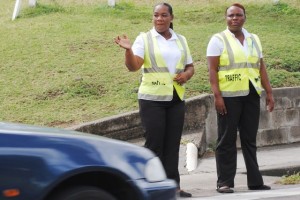Basseterre, St. Kitts (February 26, 2014) — The days when pedestrians used to hesitate, and oftentimes waste valuable time to allow erratic drivers drive past before they could make an attempt to cross the streets are long gone, thanks to the People Employment Programme (PEP).

“We have Traffic Wardens right now who are out there ensuring that the citizens are safe when crossing the streets,” said Commissioner of Police Mr Celvin G. Walwyn in a recent interview. “They are ensuring that the school children are safe when crossing the streets and this was facilitated through the use of PEP.”
The People Employment Programme which is a Federal Government of St. Kitts and Nevis initiative was launched by Prime Minister the Rt Hon Dr Denzil Douglas in December 2012, and according to Project Manager Mr Geoffrey Hanley, safety of pedestrians was a priority and hence PEP recruited 55 persons who were seconded for traffic duties.
“PEP is not only addressing the needs of the jobless,” said Mr Hanley. “We also look at areas where there is need and after consulting with the relevant authorities, in this case the Royal St. Christopher and Nevis Police Force, we saw the need. While addressing that need, we have put a number of persons in gainful employment.”
Commissioner of Police, Mr Walwyn, said that those attached as traffic wardens and crossing guards are eager to learn and observed that since the PEP workers have been trained by the Traffic Department to do those duties, when vacancies become available they will be the best placed to take them.
Head of the Traffic Department, Inspector Carl Caines, said that those now attached to the department have been deployed all over the island. The ones in Basseterre report to the St. Johnson’s Police Station, while those in the country report to the police stations in their districts, and some who are attached to schools are allowed to report to the schools.
“When they came in they had training how to assist children cross the streets, the dos and don’ts in terms of how to get out in the traffic, and how to stop the traffic,” explained Inspector Caines. “They also trained on the crossing strip on the ground itself, which was done mostly by the seasoned traffic wardens; those in the blue.”
He however clarified that traffic wardens in blue are not members of the police force, but are civilians attached to the force.
According to Inspector Caines, traffic wardens from PEP are sometimes taken out on patrol duties especially when there is a march where they walk along with the children, an area he said they were very good. Once the rush hours that require them to be on the roads are over, they are used at the office to do clerical work.
“They have been a great support to us because we now have released some regular traffic wardens from their posts where they were and have them around Basseterre and that has taken pressure from our regular police so they can be engaged elsewhere,” commented Inspector Caines. “They have really come on board at the right time.”
Asked what the difference was in the role between traffic wardens and crossing guards, the head of Traffic Department said that traffic wardens are authorised by the Commissioner of Police to issue traffic violation tickets. They however do not have the power to arrest.
“Crossing guards are just to help the children cross the busy streets for now, but eventually they will be traffic wardens when they can issue tickets to persons who would have committed traffic offences,” he explained, and added that the next stop for them would be to become regular police.
Traffic Wardens Myrtle Barzey and Odessa Lewis who are deployed at different positions on the busy Cayon Street in Basseterre joined PEP in March last year and were enlisted to work as traffic wardens as that was their preference. Ms Barzey who had worked for the Port Authority had some related experience.
Crossing guard Jamella Bishop is deployed on Cayon Street near the launder matt in St. Johnson’s Village. After the rush hours she would normally go to the St. Johnson’s Police Station and help with reception duties. The three are thankful to PEP for offering them an avenue that could lead them to working as law enforcement officers.
